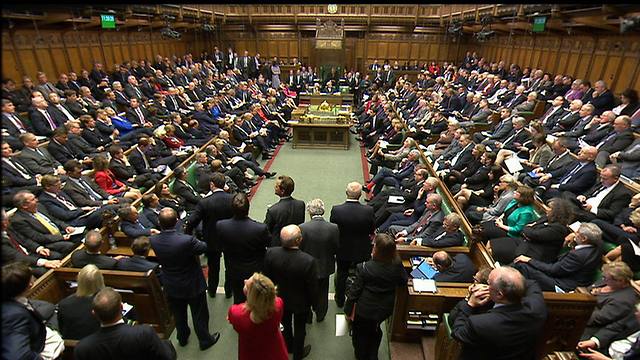British parliament votes in favor of recognizing Palestine
In symbolic vote after 4-hour debate, 274 voted in favor of recognition while only 12 voted against; amendment to motion adds recognition is 'a contribution to securing a negotiated two-state solution.'
After a four-hour debate during which over 50 MPs spoke, the British Parliament overwhelmingly voted in favor of the government recognizing Palestine as a state on Monday night.
The ayes had it when 274 MPs voted to adopt the non-binding motion and only 12 voted against it.
The original motion stipulated that "this House believes that the government should recognize the state of Palestine alongside the state of Israel."
During the debate it was amended to include the words "as a contribution to securing a negotiated two-state solution."
Prime Minister David Cameron and his government ministers abstained from the vote, which was called by an opposition lawmaker, and Cameron's spokesman earlier said foreign policy would not be affected whatever the outcome.
The debate that preceded the vote took place in a House of Commons that was more than half-empty. Only 286 of 650 lawmakers voted, with many outside the government choosing to abstain.
Britain does not designate Palestine as a state, but says it could do so at any time if it believed it would help the long-running peace process between the Palestinians and Israel.
Lawmakers who backed the motion said it would increase pressure on Israeli and Palestinian authorities to revive the stalled peace process.
"Its purpose is very simple, based upon the belief that the recognition of a state of Palestine, alongside a state of Israel will add to the pressure for a negotiated two-state solution and may bring that prospect a little closer to fruition," said Jack Straw, who served as foreign minister between 2001 and 2006.
Labour Party legislator Grahame Morris said recognizing a Palestinian state could help break the impasse in peace negotiations before it was too late.
Conservative lawmaker Nicholas Soames - grandson of World War II Prime Minister Winston Churchill - said that "to recognize Palestine is both morally right and is in our national interest."
The British government said progress towards a two-state solution was urgent, and recognition of Palestine as a state should be carefully timed to help that outcome.
"The UK will bilaterally recognise a Palestinian state when we judge that it can best help bring about the peace," said Tobias Ellwood, the government minister with responsibility for the Middle East.
"You can, after all ... only play this card once," he said. "Once it's done, you cannot repeat it, so the timing of this is critical."
The motion in Britain's lower house of parliament, put forward by a lawmaker from the opposition Labour party, asked parliamentarians whether they believe the government should recognize the state of Palestine.
It has the backing of the left-leaning Labour party's leadership which has told its lawmakers to vote in favor of the motion, an edict which has caused anger with some pro-Israel members of parliament set to rebel or stay away altogether.
According to the British media, some of the party's shadow ministers are outraged at being told by leader Ed Miliband how to vote on the issue, as they support recognition through as part of a peace agreement. They are reportedly considering a boycott on Monday should their lobbying to allow a free vote prove to be unsuccessful.
British newspaper the Independent quoted a senior pro-Israel MP as saying that, "To say that there is a row going on it putting it very mildly. People are furious. This is an attempt to rip up 13 years of carefully calibrated policy. It total madness and makes the prospect of peace less rather than more likely.”
Other parties allowed their lawmakers to vote according to their own consciences.
The vote is unlikely to shift official policy, as it is non-binding and would not force the British government to changes its diplomatic stance. It was designed instead to raise the political profile of the issue.
The debate comes as Sweden's new center-left government is set to officially recognize Palestine, a move that has been criticized by Israel.
The UN General Assembly approved the de facto recognition of the sovereign state of Palestine in 2012 but the European Union and most EU countries, including Britain, have yet to give official recognition.
The Palestinians want an independent state in the West Bank and Gaza, with its capital in East Jerusalem.
While Gaza's boundaries are clearly defined, the precise territory of what would constitute Palestine in the West Bank and East Jerusalem will only be determined via negotiations with Israel on a two-state solution, negotiations which are currently on hold.
The Associated Press contributed to this report.











